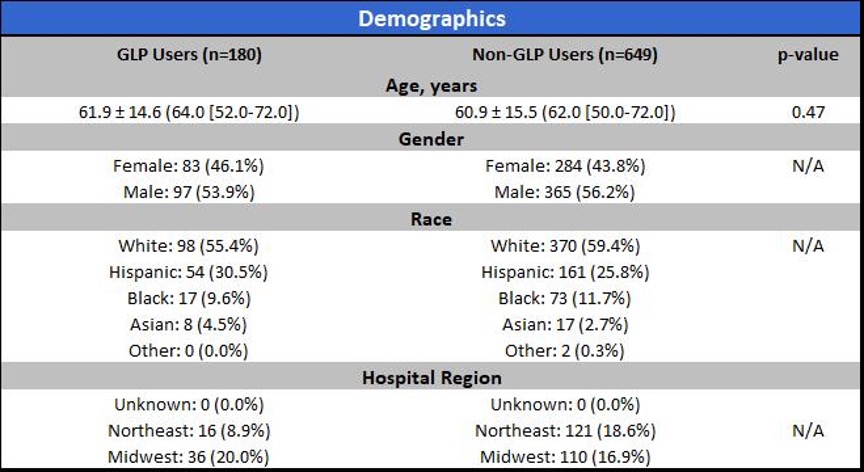Tuesday Poster Session
Category: IBD
P5358 - Impact of GLP-1 Therapy on Disease Outcomes in Patients With Inflammatory Bowel Disease and Type 2 Diabetes: A Nationwide Analysis
Tuesday, October 28, 2025
10:30 AM - 4:00 PM PDT
Location: Exhibit Hall

Fariha Hasan, MD
Cooper University Hospital
Camden, NJ
Presenting Author(s)
Fariha Hasan, MD1, Aayushi Pareek, MD2, Kartik Dapke, MBBS3, Aizaz Ali, MBBS4, Daniel Guirguis, MD, MS5, Shahryar Khan, MD6, Hareesha Rishab Bharadwaj, 7, Rachel Frank, MD8, Krysta Contino, MD9
1Cooper University Hospital, Camden, NJ; 2Mayo Clinic, Jacksonville, FL; 3Mayo Clinic, Florida, Jacksonville, FL; 4Khyber Medical college, Peshawar, Mardan, North-West Frontier, Pakistan; 5St. Luke's University Hospital, Hatfield, PA; 6University of Kansas Medical Center, Kansas City, KS; 7The University of Manchester, Manchester, England, United Kingdom; 8Cooper University Hospital, Philadelphia, PA; 9Cooper Health Gastroenterology, Mount Laurel, NJ
Introduction: Inflammatory bowel disease (IBD) involves immune dysregulation and inflammation in genetically predisposed individuals. Comorbidities like type 2 diabetes complicate management and influence treatment outcomes. GLP-1 receptor agonists (GLP-RA), used for diabetes, exhibit potential anti-inflammatory effects. This study examines associations between GLP-RA therapy and IBD outcomes (vs. other anti-diabetic treatments) in patients with IBD and type 2 diabetes.
Methods: The 2019-2020 National Inpatient Sample (NIS) was analyzed for patients with diabetes (types 1/2) and IBD (ulcerative colitis/Crohn’s), identified via ICD-10 codes. Groups included GLP-RA users and non-users. The primary outcomes assessed were corticosteroid use, IBD-related surgeries, and length of stay (LOS). Baseline characteristics were compared using descriptive analysis. Univariate and multivariate Cox regression analyses were performed to evaluate the association between GLP-1 agonist use and each primary outcome, adjusting for covariates. All statistical analyses were conducted using Python version 3.13.0.
Results: A total of 829 patients with IBD and DM were included in the study. Of these, 69.7% had UC, and 55.7% were female. The mean age of the cohort was 61 ± 15.3 years. Baseline characteristics are given in Table 1. GLP-RA use was associated with a significantly reduced composite outcome, including shorter length of stay, fewer IBD-related surgeries and decreased need for corticosteroids (adjusted hazard ratio [aHR]: 0.55, 95% confidence interval [CI]: 0.34–0.89, P = 0.012). The protective effect of GLP-RAs was more pronounced in patients with obesity (aHR: 0.91, 95% CI: 0.91–0.92). Similar trends were observed for corticosteroid use, although patients with complicated diabetes had a significantly increased risk of corticosteroid use (aHR: 3.76, 95% CI: 3.63–3.89). Additionally, corticosteroid use was associated with an increased risk of IBD-related surgeries (aHR: 2.74, 95% CI: 1.53–4.88). Other individual outcomes did not reach statistical significance in multivariate analysis (Table 2).
Discussion: Our study shows GLP-RAs improve outcomes in IBD patients with type 2 diabetes, particularly those with obesity. This may reflect the “obesity paradox,” driven by weight loss, enhanced metabolic regulation, and immune modulation via reduced pro-inflammatory cytokines. These results support GLP-RAs as a therapeutic strategy for IBD patients with metabolic comorbidities.

Figure: Table 1. Baseline Demographic Characteristics of GLP-1 Users vs. Non-Users

Figure: Table 2. Clinical Characteristics, Comorbidities and Outcomes of GLP-1 Users vs. Non-Users
Disclosures:
Fariha Hasan indicated no relevant financial relationships.
Aayushi Pareek indicated no relevant financial relationships.
Kartik Dapke indicated no relevant financial relationships.
Aizaz Ali indicated no relevant financial relationships.
Daniel Guirguis indicated no relevant financial relationships.
Shahryar Khan indicated no relevant financial relationships.
Hareesha Rishab Bharadwaj indicated no relevant financial relationships.
Rachel Frank indicated no relevant financial relationships.
Krysta Contino indicated no relevant financial relationships.
Fariha Hasan, MD1, Aayushi Pareek, MD2, Kartik Dapke, MBBS3, Aizaz Ali, MBBS4, Daniel Guirguis, MD, MS5, Shahryar Khan, MD6, Hareesha Rishab Bharadwaj, 7, Rachel Frank, MD8, Krysta Contino, MD9. P5358 - Impact of GLP-1 Therapy on Disease Outcomes in Patients With Inflammatory Bowel Disease and Type 2 Diabetes: A Nationwide Analysis, ACG 2025 Annual Scientific Meeting Abstracts. Phoenix, AZ: American College of Gastroenterology.
1Cooper University Hospital, Camden, NJ; 2Mayo Clinic, Jacksonville, FL; 3Mayo Clinic, Florida, Jacksonville, FL; 4Khyber Medical college, Peshawar, Mardan, North-West Frontier, Pakistan; 5St. Luke's University Hospital, Hatfield, PA; 6University of Kansas Medical Center, Kansas City, KS; 7The University of Manchester, Manchester, England, United Kingdom; 8Cooper University Hospital, Philadelphia, PA; 9Cooper Health Gastroenterology, Mount Laurel, NJ
Introduction: Inflammatory bowel disease (IBD) involves immune dysregulation and inflammation in genetically predisposed individuals. Comorbidities like type 2 diabetes complicate management and influence treatment outcomes. GLP-1 receptor agonists (GLP-RA), used for diabetes, exhibit potential anti-inflammatory effects. This study examines associations between GLP-RA therapy and IBD outcomes (vs. other anti-diabetic treatments) in patients with IBD and type 2 diabetes.
Methods: The 2019-2020 National Inpatient Sample (NIS) was analyzed for patients with diabetes (types 1/2) and IBD (ulcerative colitis/Crohn’s), identified via ICD-10 codes. Groups included GLP-RA users and non-users. The primary outcomes assessed were corticosteroid use, IBD-related surgeries, and length of stay (LOS). Baseline characteristics were compared using descriptive analysis. Univariate and multivariate Cox regression analyses were performed to evaluate the association between GLP-1 agonist use and each primary outcome, adjusting for covariates. All statistical analyses were conducted using Python version 3.13.0.
Results: A total of 829 patients with IBD and DM were included in the study. Of these, 69.7% had UC, and 55.7% were female. The mean age of the cohort was 61 ± 15.3 years. Baseline characteristics are given in Table 1. GLP-RA use was associated with a significantly reduced composite outcome, including shorter length of stay, fewer IBD-related surgeries and decreased need for corticosteroids (adjusted hazard ratio [aHR]: 0.55, 95% confidence interval [CI]: 0.34–0.89, P = 0.012). The protective effect of GLP-RAs was more pronounced in patients with obesity (aHR: 0.91, 95% CI: 0.91–0.92). Similar trends were observed for corticosteroid use, although patients with complicated diabetes had a significantly increased risk of corticosteroid use (aHR: 3.76, 95% CI: 3.63–3.89). Additionally, corticosteroid use was associated with an increased risk of IBD-related surgeries (aHR: 2.74, 95% CI: 1.53–4.88). Other individual outcomes did not reach statistical significance in multivariate analysis (Table 2).
Discussion: Our study shows GLP-RAs improve outcomes in IBD patients with type 2 diabetes, particularly those with obesity. This may reflect the “obesity paradox,” driven by weight loss, enhanced metabolic regulation, and immune modulation via reduced pro-inflammatory cytokines. These results support GLP-RAs as a therapeutic strategy for IBD patients with metabolic comorbidities.

Figure: Table 1. Baseline Demographic Characteristics of GLP-1 Users vs. Non-Users

Figure: Table 2. Clinical Characteristics, Comorbidities and Outcomes of GLP-1 Users vs. Non-Users
Disclosures:
Fariha Hasan indicated no relevant financial relationships.
Aayushi Pareek indicated no relevant financial relationships.
Kartik Dapke indicated no relevant financial relationships.
Aizaz Ali indicated no relevant financial relationships.
Daniel Guirguis indicated no relevant financial relationships.
Shahryar Khan indicated no relevant financial relationships.
Hareesha Rishab Bharadwaj indicated no relevant financial relationships.
Rachel Frank indicated no relevant financial relationships.
Krysta Contino indicated no relevant financial relationships.
Fariha Hasan, MD1, Aayushi Pareek, MD2, Kartik Dapke, MBBS3, Aizaz Ali, MBBS4, Daniel Guirguis, MD, MS5, Shahryar Khan, MD6, Hareesha Rishab Bharadwaj, 7, Rachel Frank, MD8, Krysta Contino, MD9. P5358 - Impact of GLP-1 Therapy on Disease Outcomes in Patients With Inflammatory Bowel Disease and Type 2 Diabetes: A Nationwide Analysis, ACG 2025 Annual Scientific Meeting Abstracts. Phoenix, AZ: American College of Gastroenterology.
